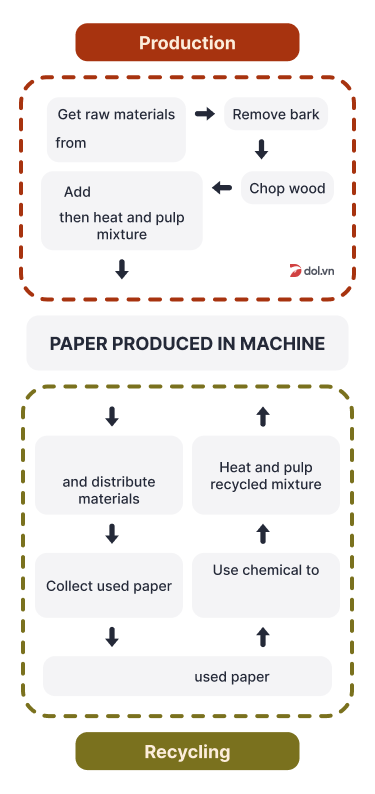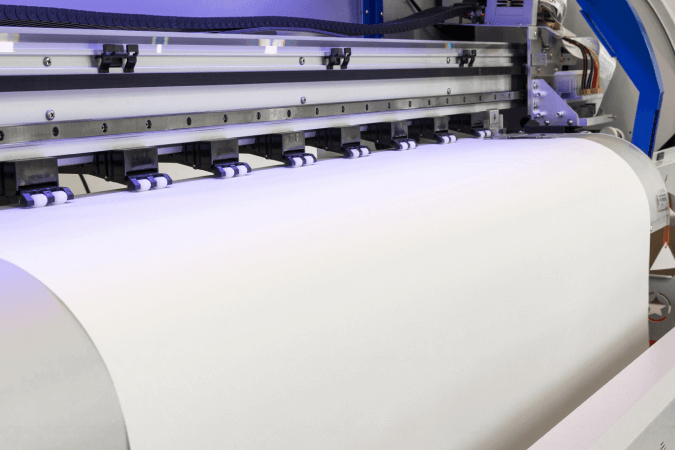Alan:
Hi Melanie - what did you think of the assignment that we got today? It looks interesting, doesn't it?
Melanie:
Yes Alan, I've always been interested in recycling but there's a lot of research to do.
Alan:
Yes - there are a lot of things I'm unsure of so it's going to be good working with you.
Melanie:
OK - well why don't we start by making a flow- chart from the notes our tutor gave us?
Alan:
Yes, um, so... on one side we could have the paper production cycle - here on the left-and on the other side the recycling.
Melanie:
Good idea. Let's start at the top with the production. The first step in the process is to get the raw materials.
Alan:
Yes - and they tend to come from pine forests.
Melanie:
OK - and then the bark is removed from the outside of the tree and after that the wood is chopped up - that's the first three stages.
Alan:
It sounds a bit complicated after that. Um, it says water is added and then the mixture is heated and made into pulp. This will be the thick paste that is used to make paper.
Melanie:
Yes - you're right because after that they use a machine to make the paper and we can put that right in the centre of the flow.chart because it's also where the recycled paper joins the process.
Alan:
Yes. So once the paper has been produced in the machine, what happens then?
Melanie:
Well, I think we should write 'print' as the next step because this is when newspapers, magazines, etc. are produced. And we could also add that they have to be distributed to stores and people's homes.
Alan:
Right, then the recycling bit starts. The old paper's collected and then it says it's taken somewhere so that someone or something can sort it. I imagine there are different kinds of paper - or things like paper clips that need to be removed.
Melanie:
Yes. Let's have a step after that. Now, how did our tutor say they do this? Oh yes - it involves chemicals, so - how is your chemistry?
Alan:
Well - not very good I'm afraid. But this is how they remove ink so - this is definitely going to need a bit of research
Melanie:
Right - the last step in the recycling section is similar to the last step in the production process with heating and pulping - before the cycle begins again.
Alan:
So I think going through the processes helped. Now we need to decide how we're going to do this assignment.
Melanie:
Yes. I guess what we need to do is take the processes and divide them up between us. But we could start thinking about an introduction.
Alan:
Yes, OK ... well I can start doing that. I think I have enough to go on already.
Melanie:
Good. And there are a few areas where we need a lot more information. I think I'll start with something easy - let's say the paper collection. I could go to the resource centre to do some research.
Alan:
Well I think a better idea would be to approach someone who's involved in the process. What about contacting the council?
Melanie:
Oh - good idea. Yes - I'll do that instead. They're bound to have some information. And I know just the thing to add to our work to make it even more interesting.
Melanie:
Well - in my last assignment, I added a few pictures and the feedback I got was that this wasn't academic enough. So what might really bring it to life would be to include some data - provided we can find some.
Alan:
Yes - that sounds excellent. Well - we certainly have a lot to do and not much time to do it in.
Melanie:
You're right. I think we have about five weeks so I suggest we create a plan of work today. The end of the month is nearly three weeks away and then we have a few days' holiday
Alan:
Yes - so let's see if we can get the first draft done by then so we can take a short break.
Melanie:
OK - then after the break we'll have just over a week to complete it. I wonder if we could get someone to review our work for us a few days before the deadline so we can make some final changes. What about your friend Henry?
Alan:
Well - the best person would be our tutor. Henry's very good but he’s taking a whole week’s holiday and there won’t be enough time when he returns.
Melanie:
OK, then. That’s fine.

 Nghe thấy "They tend to come from pine forests"
=> Vật liệu thường lấy từ rừng thông
=> Đáp án là pine forests
Nghe thấy "They tend to come from pine forests"
=> Vật liệu thường lấy từ rừng thông
=> Đáp án là pine forests 


